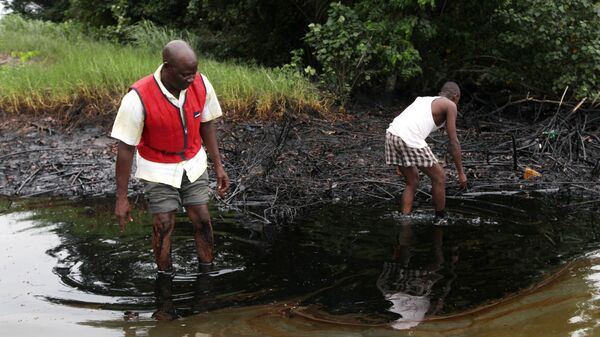MOSCOW, November 13 (Sputnik) – Shell oil and gas giant has repeatedly made false estimates of the size and scale of pollution caused by 2008 oil spills from its pipelines in the town of Bodo in Nigeria's Ogoniland region, Amnesty International said Thursday.
As the people in the area continue to suffer the effects of land, water and air pollution by Shell, the company diminishes the oil spill figures to avoid compensation payments, according to the press release published on the organization's website.
"Amnesty International firmly believes Shell knew the Bodo data were wrong. If it did not it was scandalously negligent – we repeatedly gave them evidence showing they had dramatically underestimated the spills," Audrey Gaughran, Director for Global Issues at Amnesty International, was quoted in the press release as saying.
According to Amnesty International, Shell has been falsifying the data in Joint Investigation Visit reports, which determine whether the communities affected by the spill get any compensation or not and the amount of the payments.
"These spill investigation reports have cheated whole communities out of proper compensation," Gaughran claimed.
"Pollution from Shell's operations has wrecked people's homes, farms and fishing waters — their ability to send their children to school and put food on the table," he added.
The total amount of oil spill is over 100,000 barrels, while Shell has repeatedly claimed that the figure is much lower, Amnesty International said.
The UK court documents, revealed by Amnesty International, say Shell not only diminished the scale of damage caused by the oil spill in the Bodo area of the Niger Delta, but also could have prevented it, as it knew for years that the pipeline was in a very poor condition.
"It's outrageous that Shell has continued to blame the vast majority of its spills on saboteurs while knowing full well how bad a state its pipelines were in," Gaughran stressed, adding that "after all these revelations, the company stands completely discredited."
Nigeria, a member of the Organization of the Petroleum Exporting Countries (OPEC), is Africa's largest oil producer and its most populous nation, but the oil producing regions remain underdeveloped and polluted.
Shell's Nigerian subsidiary has been operating since 1956, when the first commercial oil field was discovered in the Ogoniland region.
Shell's operation in Niger Delta has caused numerous oil spills over the past 50 years.
The two major oil spills, that came from Shell's Trans Niger Pipeline in 2008, have caused significant damage to the area's environment as well as to the health of the local residents.
Shell now faces a lawsuit in the UK from the Bodo community in the Niger Delta. The trial is expected to take place at the High Court London May 2015. The case is the first time Shell has faced formal proceedings in the UK for its role in the Niger Delta pollution.



